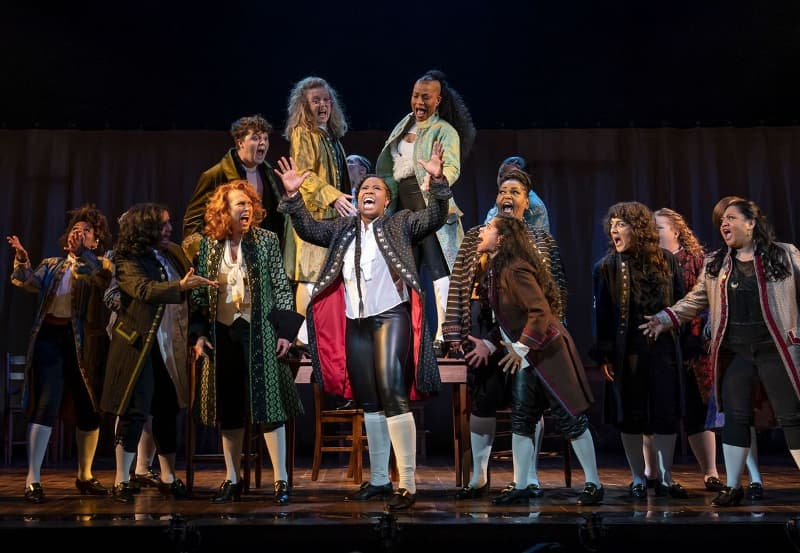The Thrill of ‘1776’ Revisited
Like Lin-Manuel Miranda’s ‘Hamilton,’ the multi-racial casting of ‘1776’ promotes inclusivity not through finger-wagging but with a generous, uplifting spirit.

The first image we see in Jeffrey L. Page and Diane Paulus’s new production of the musical “1776” is that of a black woman walking through a sea of white men. As John Trumbull’s classic painting “Declaration of Independence” is projected on a curtain, the actress Crystal Lucas-Perry — cast here as Founding Father John Adams — strides across the vast stage of Broadway’s American Airlines Theatre, shooting the audience a bemused look.
“I have come to the conclusion that one useless man is called a disgrace,” Ms. Lucas-Perry declares, as Adams, “that two are called a law firm—and that three or more become a Congress.”
The line, like the others in this revival, is taken from Peter Stone’s original libretto — based on a concept by Sherman Edwards, who wrote music and lyrics for “1776,” which won the Tony Award for best musical back in 1969. But it is presented, as other lines will be, in a rather different context.
Introduced earlier this year at Harvard’s American Repertory Theater, where Ms. Paulus is artistic director, this “1776” features a multi-racial cast composed entirely of female, transgender and non-binary actors. Ah, you’re thinking, like “Hamilton,” but with a more patently feminist and trans-friendly twist?
Well, to a point. For starters, “1776” was, and remains, kinder to Adams than Lin-Manuel Miranda’s blockbuster, which pretty much reduced our second president and this show’s protagonist to a punchline. Like Mr. Miranda, though, co-directors Mr. Page and Ms. Paulus promote inclusivity not through finger-wagging but with a generous, uplifting spirit, and Stone and Edwards have left them the perfect vehicle for that mission.
More than a half century before “Hamilton,” “1776” paid homage to the miracle of our nation’s birth while not shrinking from the labor pains, or the lingering complications. “Revolutions come into this world like bastard children,” notes the character of Benjamin Franklin — played in this production by a drolly authoritative Patrena Murray — “half improvised and half compromised.”
The focal compromise here regards slavery. Though a slave owner himself, Thomas Jefferson came to vehemently oppose the practice, and denounced it in his original draft of the Declaration. That clause was eliminated to appease Southern delegates to the Second Continental Congress; if Pennsylvania’s John Dickinson, who refused to sign the document, is the standout antagonist in “1776,” then South Carolina’s Edward Rutledge is its biggest villain.
One couldn’t imagine a better woman for the role of Dickinson than Broadway veteran Carolee Carmello, whose witty, stylish performance sends up her character’s arrogance and shortsighted fealty to King George III.
In the jaunty Act Two opener “Cool, Cool Considerate Men,” Carmello’s Dickinson brightly leads other conservative delegates in a “minuet…ever to the right/Never to the left” — that is, precisely the opposite direction in which the show’s creators were headed.
But if the rights of states and privileges of the wealthy get a wink and a nod — and some incisive commentary between production numbers — the slave trade and its stain on our history is soberly addressed. Sara Porkalob, whose Rutledge has a sweet, smooth voice and a tight smile and oozes venom, makes “Molasses to Rum” — a lacerating musical account of the North’s accountability in the trade — a menacing tour de force, abetted by Mr. Page’s haunting choreography, which turns the black performers playing delegates into slaves at an auction, and a stark, bluesy arrangement.
John Clancy’s savvy, stinging orchestrations are again central, along with AnnMarie Milazzo’s gospel-informed vocal design, in the equally potent lament “Momma, Look Sharp,” which as led by Salome Smith — the woman playing the courier, surrounded by other women, suggesting mothers and wives and daughters left behind by the carnage of war — takes on a new, harrowing resonance. (It’s worth noting that both the courier and the congressional custodian, who sweeps the tables and fetches rum for the delegates, are played by black actresses.)
But there’s also abundant joy to be found in this staging — in the easy, lovely rapport, for instance, between Ms. Lucas-Perry’s Adams and Allison Kaye Daniel’s glowing Abigail Adams, who get to read letters exchanged between the couple that weren’t included in the original production.
Friskier business is clearly at hand between Elizabeth A. Davis’s elegant Thomas Jefferson and Eryn LeCroy’s silver-voiced Martha Jefferson — a point made more amusing by the fact that Ms. Davis is now visibly pregnant. (Jefferson is not supposed to be pregnant; Ms. Davis was merely permitted to remain in her condition, presumably in the spirit of inclusion.)
There’s pride here as well, both in the musical itself and in the production, which wraps with a stirring tribute to the men acknowledged here while inviting us to applaud the diverse performers representing them. The passage is at once progressive and thrillingly patriotic, offering a timely reminder that those qualities needn’t be mutually exclusive.

